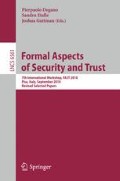Abstract
We formally study two privacy-type properties for online auction protocols: bidding-price-secrecy and receipt-freeness. These properties are formalised as observational equivalences in the applied π calculus. We analyse the receipt-free auction protocol by Abe and Suzuki. Bidding-price-secrecy of the protocol is verified using ProVerif, whereas receipt-freeness of the protocol is proved manually.
Access this chapter
Tax calculation will be finalised at checkout
Purchases are for personal use only
Preview
Unable to display preview. Download preview PDF.
References
Harkavy, M., Tygar, J.D., Kikuchi, H.: Electronic auctions with private bids. In: Proc. 3rd USENIX Workshop on Electronic Commerce, pp. 61–74 (1998)
Cachin, C.: Efficient private bidding and auctions with an oblivious third party. In: Proc. CCS 1999, pp. 120–127. ACM Press, New York (1999)
Naor, M., Pinkas, B., Sumner, R.: Privacy preserving auctions and mechanism design. In: Proc. ACM-EC 1999, pp. 129–139. ACM Press, New York (1999)
Abe, M., Suzuki, K.: Receipt-free sealed-bid auction. In: Chan, A.H., Gligor, V.D. (eds.) ISC 2002. LNCS, vol. 2433, pp. 191–199. Springer, Heidelberg (2002)
Lipmaa, H., Asokan, N., Niemi, V.: Secure vickrey auctions without threshold trust. In: Blaze, M. (ed.) FC 2002. LNCS, vol. 2357, pp. 87–101. Springer, Heidelberg (2003)
Chen, X., Lee, B., Kim, K.: Receipt-free electronic auction schemes using homomorphic encryption. In: Lim, J.-I., Lee, D.-H. (eds.) ICISC 2003. LNCS, vol. 2971, pp. 259–273. Springer, Heidelberg (2004)
Lowe, G.: Breaking and fixing the Needham-Schroeder public-key protocol using FDR. In: Margaria, T., Steffen, B. (eds.) TACAS 1996. LNCS, vol. 1055, pp. 147–166. Springer, Heidelberg (1996)
Chadha, R., Kremer, S., Scedrov, A.: Formal analysis of multi-party contract signing. In: Proc. CSFW 2004, pp. 266–279. IEEE CS, Los Alamitos (2004)
Abadi, M., Fournet, C.: Mobile values, new names, and secure communication. In: Proc. POPL 2001, pp. 104–115. ACM, New York (2001)
Blanchet, B.: An efficient cryptographic protocol verifier based on prolog rules. In: Proc. CSFW 2001, pp. 82–96. IEEE CS, Los Alamitos (2001)
Delaune, S., Kremer, S., Ryan, M.D.: Verifying privacy-type properties of electronic voting protocols. J. Computer Security 17(4), 435–487 (2009)
Kremer, S., Ryan, M.D.: Analysis of an electronic voting protocol in the applied pi calculus. In: Sagiv, M. (ed.) ESOP 2005. LNCS, vol. 3444, pp. 186–200. Springer, Heidelberg (2005)
Jonker, H.L., Mauw, S., Pang, J.: A formal framework for quantifying voter-controlled privacy. J. Algorithms 64(2-3), 89–105 (2009)
Dolev, D., Yao, A.C.C.: On the security of public key protocols. IEEE Trans. Information Theory 29(2), 198–207 (1983)
Blanchet, B., Abadi, M., Fournet, C.: Automated verification of selected equivalences for security protocols. J. Log. Algebr. Program. 75(1), 3–51 (2008)
Backes, M., Hriţcu, C., Maffei, M.: Automated verification of remote electronic voting protocols in the applied pi-calculus. In: Proc. CSF 2008, pp. 195–209. IEEE CS, Los Alamitos (2008)
Küsters, R., Truderung, T.: An epistemic approach to coercion-resistance for electronic voting protocols. In: Proc. S&P 2009, pp. 251–266. IEEE CS, Los Alamitos (2009)
Küsters, R., Truderung, T., Vogt, A.: A game-based definition of coercion-resistance and its applications. In: Proc. CSF 2010, pp. 122–136. IEEE CS, Los Alamitos (2010)
Author information
Authors and Affiliations
Editor information
Editors and Affiliations
Rights and permissions
Copyright information
© 2011 Springer-Verlag Berlin Heidelberg
About this paper
Cite this paper
Dong, N., Jonker, H., Pang, J. (2011). Analysis of a Receipt-Free Auction Protocol in the Applied Pi Calculus. In: Degano, P., Etalle, S., Guttman, J. (eds) Formal Aspects of Security and Trust. FAST 2010. Lecture Notes in Computer Science, vol 6561. Springer, Berlin, Heidelberg. https://doi.org/10.1007/978-3-642-19751-2_15
Download citation
DOI: https://doi.org/10.1007/978-3-642-19751-2_15
Publisher Name: Springer, Berlin, Heidelberg
Print ISBN: 978-3-642-19750-5
Online ISBN: 978-3-642-19751-2
eBook Packages: Computer ScienceComputer Science (R0)

